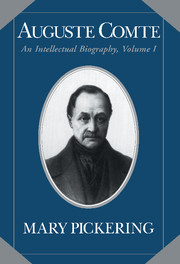Book contents
- Frontmatter
- Contents
- Acknowledgments
- Abbreviations
- Introduction
- 1 The Early Years
- 2 The Life and Works of Saint-Simon up to 1817
- 3 Comte's First Works for Saint-Simon
- 4 Comte's Growing Independence, 1819–1821
- 5 The Fundamental Opuscule and Comte's Rupture with Saint-Simon
- 6 The Aftermath of the Rupture: The Search for Connections
- 7 Comte's Efforts to Establish Himself
- 8 Intellectual and Mental Crises
- 9 The Road to Recovery, 1828–1830
- 10 Years of Success and Confrontation, 1830–1838
- 11 Comte's Changing Psyche and Aberrant Behavior, 1838–1840
- 12 The Encounter between Two Luminaries: Comte and Mill
- 13 1842: A Turning Point
- 14 Cours de philosophie positive: Positivism and the Natural Sciences
- 15 Cours de philosophie positive: Sociology
- Conclusion
- Bibliography
- Index
Introduction
Published online by Cambridge University Press: 06 January 2010
- Frontmatter
- Contents
- Acknowledgments
- Abbreviations
- Introduction
- 1 The Early Years
- 2 The Life and Works of Saint-Simon up to 1817
- 3 Comte's First Works for Saint-Simon
- 4 Comte's Growing Independence, 1819–1821
- 5 The Fundamental Opuscule and Comte's Rupture with Saint-Simon
- 6 The Aftermath of the Rupture: The Search for Connections
- 7 Comte's Efforts to Establish Himself
- 8 Intellectual and Mental Crises
- 9 The Road to Recovery, 1828–1830
- 10 Years of Success and Confrontation, 1830–1838
- 11 Comte's Changing Psyche and Aberrant Behavior, 1838–1840
- 12 The Encounter between Two Luminaries: Comte and Mill
- 13 1842: A Turning Point
- 14 Cours de philosophie positive: Positivism and the Natural Sciences
- 15 Cours de philosophie positive: Sociology
- Conclusion
- Bibliography
- Index
Summary
At twenty-seven, Auguste Comte remarked to a friend, “The essence of my life is a novel, and an intense novel, which would appear truly extraordinary if I ever published it under some assumed names.” Although Comte never turned his attention to writing fiction, he remained thoroughly preoccupied by his own emotional development, which increasingly dominated his philosophy. In his letters and works, he set out to refashion his life to give the impression that he was a thoroughly original and creative genius, whose philosophy was unjustly neglected by his “metaphysical” contemporaries. Indifference to Comte's life and work has continued to be a problem. Although Comte is among the dozen most important intellectual figures in modern European history, he has never been the subject of an exhaustive or balanced book in any language. His story, however, is worth telling. This study in intellectual history seeks to fill this gap by deciphering the various strands of the myth consciously elaborated by Comte and further embellished by his disciples. It concentrates on Comte's so-called first career, which ended with the completion of his most influential work, the Cours de philosophie positive, in 1842, the year he turned forty-four. It was during this period that he made his main contribution to modern culture: the establishment of positivism and sociology.
- Type
- Chapter
- Information
- Auguste ComteAn Intellectual Biography, pp. 1 - 6Publisher: Cambridge University PressPrint publication year: 1993

